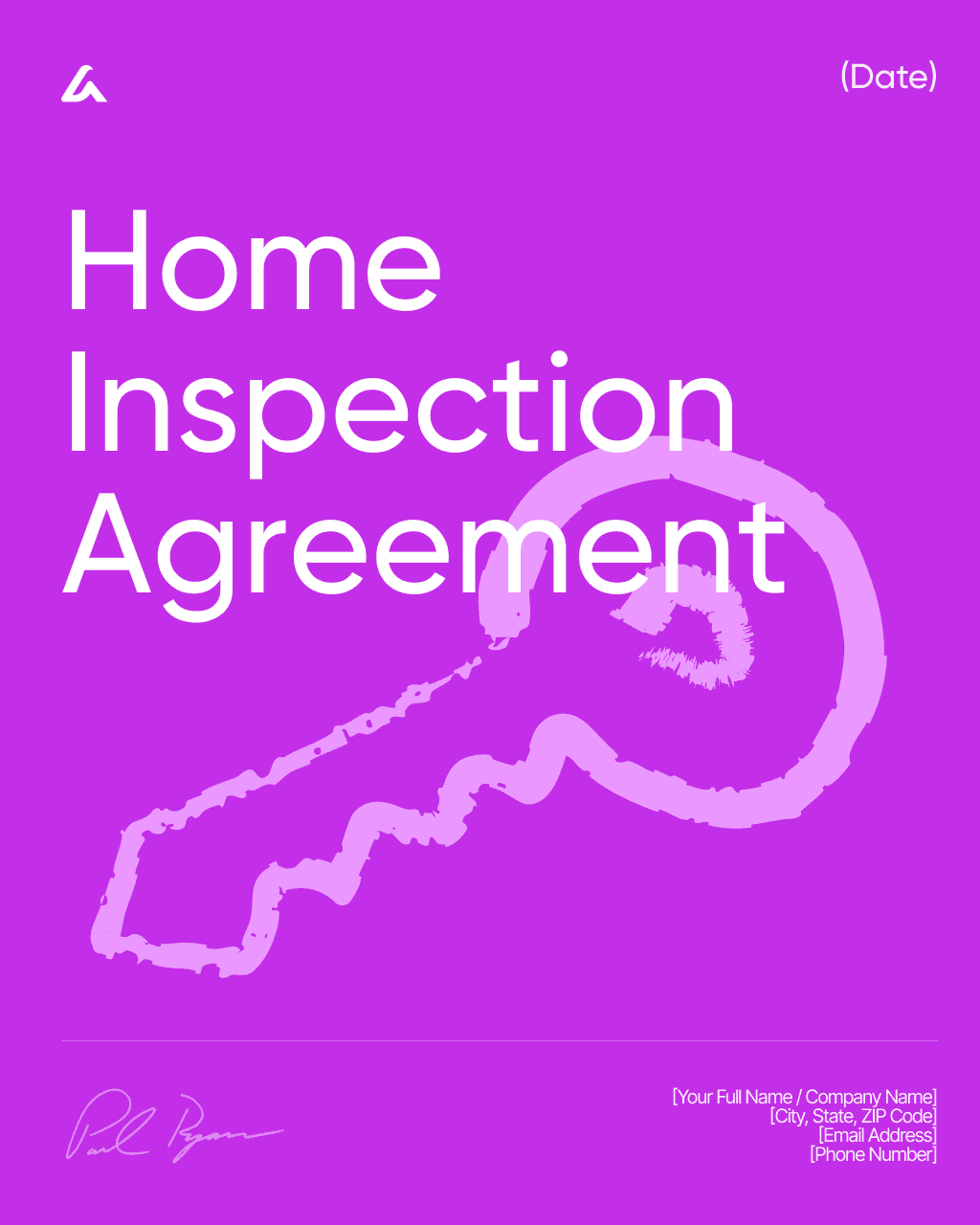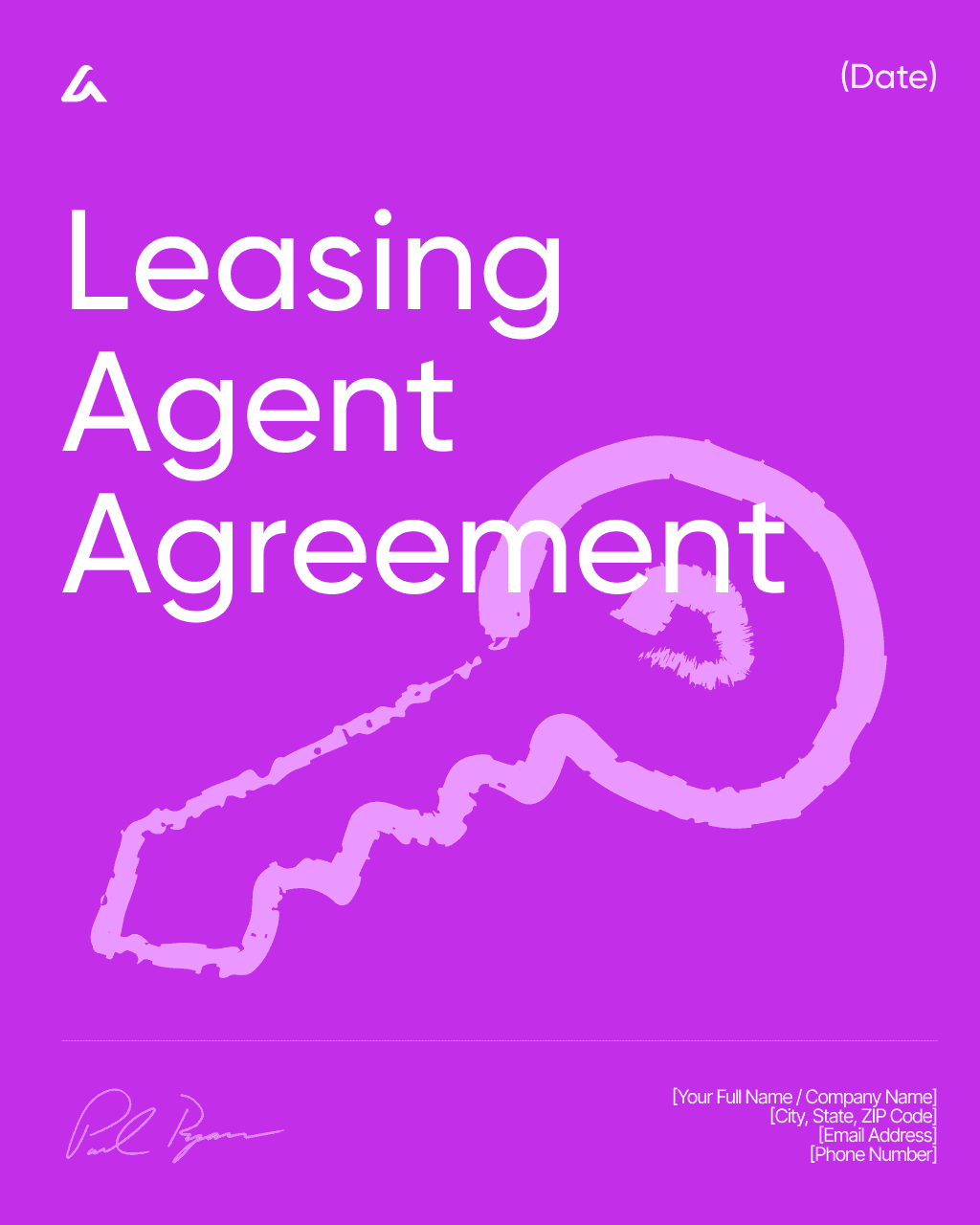Free template
Property Management Agreement Template: Duties, Fees & Term Florida
Draft your custom agreement in seconds with AI Lawyer
Download template
Property Management Agreement
This Property Management Agreement ("Agreement") is made and entered into on [Date], by and between:
Owner: [Property Owner’s Full Name / Company Name]
Address: [Owner’s Address]
and
Manager: [Property Manager’s Full Name / Company Name]
Address: [Manager’s Address]
Together referred to as the "Parties."
1. Property Description
Owner appoints Manager for [Full Address], including dwelling units, common areas, and amenities (the “Property”). HOA/condo rules, if applicable, shall be integrated into the management plan.
2. Term
Effective [Start Date] through [End Date], automatically renewing for [12] months unless either Party gives [45] days’ written notice. Hurricane or emergency‑related suspensions of services shall be communicated to Owner promptly.
3. Scope of Services
Manager markets vacancies, screens applicants, drafts leases, collects rent and deposits, coordinates maintenance, and manages vendor relationships. Manager will prioritize habitability and safety issues, especially water intrusion and mold prevention following storms. Monthly statements will include rent roll, receipts, and expense summaries.
4. Manager Compensation
Management fee: ☐ [X]% of collected rent ☐ Flat $[Amount]. Leasing fee: $[Leasing Fee]; renewal fee: $[Renewal Fee]. Emergency mitigation and restoration work above $[Capital Threshold] requires Owner approval when practical.
5. Owner Responsibilities
Owner funds an operating reserve of $[Reserve], maintains required insurance, and authorizes non‑routine repairs when needed. Owner remains responsible for property taxes, mortgage, and HOA/condo assessments.
6. Financial Handling
Manager maintains a separate operating account for the Property and provides monthly remittances and reports. Owner may inspect records upon [X] business days’ notice.
7. Liability and Indemnification
Manager is not liable for losses caused by tenants, vendors, storms, or other events beyond Manager’s control, except where due to Manager’s gross negligence or willful misconduct. Owner agrees to indemnify Manager consistent with this allocation of risk.
8. Insurance
Owner shall maintain property and general liability insurance and name Manager as additional insured; wind/flood coverage should be considered where applicable.
9. Termination
Either Party may terminate on [30] days’ written notice or immediately for material breach. Manager will deliver funds, records, and keys within [X] business days.
10. Compliance and Notices
Parties will comply with applicable housing, habitability, and consumer‑protection laws. Formal notices via certified mail or courier; email as courtesy; emergency contact methods should be maintained.
11. Governing Law; Entire Agreement
Governed by the laws of [State/Country]. Entire agreement; written amendments only; severability applies.
IN WITNESS WHEREOF, the Parties have executed this Property Management Agreement as of the date first written above.
Owner Signature
Name: __________________________
Date: __________________________
Manager Signature
Name: __________________________
Date: __________________________
No time to fill it up? Generate your custom agreement with AI Lawyer in seconds
Details
Learn more about
Property Management Agreement Template: Duties, Fees & Term Florida
Florida Property Management Agreement FAQ
What is a Property Management Agreement?
A Property Management Agreement is a legally binding contract between a property owner and a property manager or management company that defines the scope of services, responsibilities, and authority of the manager. It sets the framework for how the property will be operated, maintained, and rented out on the owner’s behalf. The agreement typically details how rent will be collected, how tenants will be managed, and how maintenance and repairs will be handled. It also specifies the manager’s compensation, reporting duties, and the duration of the contract.
In short, a Property Management Agreement ensures that both the owner and the manager understand their roles and expectations, providing clear rules for day-to-day management and helping prevent misunderstandings or legal disputes.
When to use a Property Management Agreement?
A Property Management Agreement should be used whenever a property owner hires another person or company to manage their property on their behalf. This includes situations where the manager is responsible for collecting rent, handling maintenance, finding or screening tenants, or overseeing daily operations.
The agreement is especially important if the manager has access to the owner’s funds or authority to make decisions regarding repairs, leases, or evictions. Having a written contract helps define the scope of responsibilities, prevent misunderstandings, and protect both parties legally.
Even if you’re working with someone you trust, a Property Management Agreement ensures that every term — from fees to termination rights — is clearly documented and enforceable.
What should be included in a Property Management Agreement?
A well-drafted Property Management Agreement should clearly outline all essential terms to protect both the property owner (or association) and the management company. It should include the following key components:
Parties involved: Identify the property owner or association and the management company entering into the agreement.
Property description: Specify the exact property or properties covered by the agreement.
Scope of services: Detail the manager’s responsibilities, such as budgeting, financial reporting, maintenance oversight, staff supervision, regulatory compliance, and tenant or owner communication.
Fees and payment structure: Explain how management fees are calculated — whether as a flat rate, a percentage of rent or assessments, or separate charges for specific services.
Term of the agreement: Define the length of the contract, renewal terms, and any automatic extensions.
Termination provisions: Describe how either party can end the agreement, including notice periods and valid reasons for early termination.
Insurance and liability: Outline required insurance coverage and include indemnification clauses to protect both parties.
Dispute resolution: Specify how disputes will be handled — for example, through mediation, arbitration, or legal proceedings.
Reporting requirements: Set expectations for financial statements, maintenance reports, and other updates, including how often they must be provided.
Together, these elements ensure that the agreement is transparent, enforceable, and fair to both sides.
Can a Property Management Agreement be changed after signing?
Yes, a Property Management Agreement can be changed after signing, but only if both parties agree to the modifications. Any changes — such as adjustments to management fees, responsibilities, or contract duration — should be made in writing through an official amendment or addendum to the original agreement.
Both the property owner and the management company must sign and date the amendment for it to be legally valid. Verbal agreements or informal promises are not enforceable and can lead to disputes.
It’s also good practice to review the original contract before making changes, as many agreements include specific clauses outlining how modifications must be handled. Keeping all amendments properly documented ensures clarity and legal protection for both parties.
How are rent collections and owner payments handled under the Property Management Agreement?
Under a Property Management Agreement, the property manager is typically responsible for collecting rent and other payments from tenants on behalf of the property owner. The agreement should clearly outline how these funds are received, processed, and transferred to the owner — usually through direct deposit or another agreed payment method.
It should also specify the frequency of owner payments (such as monthly or bi-weekly) and detail any deductions the manager is authorized to make before transferring funds, including management fees, maintenance costs, or approved expenses.
To maintain transparency, the agreement often requires the manager to provide regular financial reports or statements showing rent collected, expenses paid, and net income distributed to the owner. This structure ensures accountability and helps both parties track the property’s financial performance accurately.
Similar templates

























































